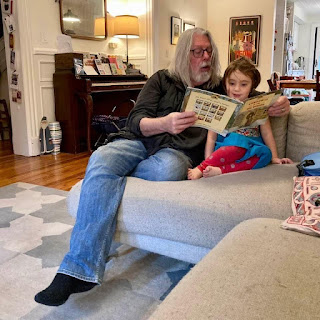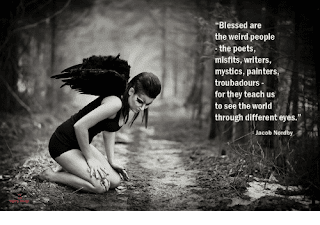One of the many reasons I stepped away from pastoral ministry after sensing in Montreal that God wanted something different from me, was the realization that my artistic references were so outdated that those both older and younger than myself often had no idea what I was talking about when sharing a popular culture quote. "Anyone, anyone? Bueller?" was still drop-dead funny and appropriate to me, but only so for an increasingly smaller cadre of those in public worship. And that circle was rapidly shrinking, too even before the pandemic. As it became increasingly clear, I no longer shared a common cultural language with that small handful of souls who were interested in public worship: from time to time we might find a measure of unity in mutual emotions, but rarely in a lingua franca of culture.
The deeper I retreated into silence, the more I accepted that "to everything there is a season," including my time in the local church. Paradoxically, while I was still committed to the way of Jesus, the importance of spiritual reflection upon culture, and the joy of making music in public, my old ways had not only become to me irrelevant but personally unsatisfying as well. So, while the Psalmist was probably right in telling me it was time to "Sing a new song unto the Lord," I had no idea what that might sound like let alone what words to use.
Thinking big and acting strong – led me into all that’s wrong.
Hitting bottom taught me well strategies to get through Hell.
Touch the wound in front of you – that’s all you can really do.
Keep it close, don’t turn away, make room for what’s real today.
Small is me, small is you, small is holy and rings true.
Small is hard, small reveals the way our hearts can be healed.
6) The insights of Kaitlyn Curtice:
In time it dawned on me that this was a season to create the space to wait upon the Lord. I was at an age when I could afford to slow down rather than push the envelope in frantic uncertainty. And while waiting and discernment have never been my long suit, the time was right. Trusting that darkness would always be part of the journey towards light, I said, "Let's give it a go, Joe!" And after months of inward/outward waiting, fretting, trusting, and doubting, two new/old practices showed up to help me find my focus: 1) listening to Mother Nature as I gardened and walked through the wetlands; and, 2) reclaiming a few important old songs on the acoustic guitar.
Listening to the the rhythms of Mother Nature has been a consistent path for both celebration and resistance among First Nations people for millennia. Their practices are not mine to appropriate in any way, shape, or form. Yet their wisdom re: the rhythms of nature are well-known the world over. For the past three years my sacred listening and moving about required reclaiming my people's way of listening with the charism of Celtic spirituality. The beloved 4th century Welsh heretic/saint, Pelagius, insisted that: if you want to know the Creator, you must spend time with what's been created. Learning the rhythms of the seasons - and their corresponding spiritualities - has been life-changing. Getting my hands in the dirt, building raised garden beds, exploring native seeds to refashion our common space into a sacred sanctuary, and to doing so with plants, flowers, and vegetables that support bees and butterflies is teaching me a bit about patience as well as a new way to hope. Incrementally I am learning to engage reality at the speed of Mother Nature as a spiritual discipline that will carry me gratefully to my final resting place in the soil. Every Lent I used to say, "From ashes we came and to ashes we shall return," before making the sign of the Cross on the foreheads of saints and sinners. Now, I scour seed catalogues and blogs for appropriate plants that might help renew a bit of life within the ashes of this small corner of God's green earth.
And returning to my acoustic guitar: I haven't played jazz or rock bass in three years. Writing this makes me sad. But after an intense 7 years of serious music, it was time to leave my upright bass sitting in the corner of my study. These are small and quiet days. My soul seeks gentleness and nuance. It started writing "Small is Holy" three years ago with an opening verse and chorus that showed up almost automatically:
Hitting bottom taught me well strategies to get through Hell.
Touch the wound in front of you – that’s all you can really do.
Keep it close, don’t turn away, make room for what’s real today.
Small is me, small is you, small is holy and rings true.
Small is hard, small reveals the way our hearts can be healed.
But I couldn't get the rest of it right: I tried some Tom Petty-esque grooves but they felt derivative. Other verses and the bridge sounded preachy. I was searching for something more gentle and quiet, but I didn't yet know what that was. About this same time I exited music making with my dear friends because I felt stuck - and my stalled song was the outward and visible sign of my inward and spiritual pothole. We took a quick trip to Tucson to see old friends and get a break from the winter and when we got home: BAM it was covid time and solitude and silence became our new normal.
Curiously, inch by inch, a whole new melody, chord structure and lyric started to emerge from the shell of "Small is Holy." It began to feel "real" and even alive to me. That's when I realized what a second spiritual discipline of listening slowing to the sacred within was asking of me. To date, I've reclaimed "Healer of My Soul" from JM Talbot's catalogue, Leslie Duncan's elegiac "Love Song," my stripped down take on St. Lou Reed's "Sweet Jane" and a few quiet hymns. During Advent 2021 I found beauty and rest in an instrumental setting for, "O Come, O Come Emmanuel" and "In the Bleak Midwinter." Revisiting these small, quiet songs has been salvific and satisfying. For as much as I like to tear it up, shake my booty, and rock'n'roll all night long, that's not where my heart is most of the time these days.
One other new/old blessing that has arrived while waiting on the Lord has to do with following the small threads of serendipity into the synchronicity of the Holy Spirit. I've noticed six important clues showing up over the past 36 months that make me smile and sit up and take notice. Like the old adage says: "When the student is ready, the Buddha will appear." You may enjoy following these links, too.
1) The writing and music of Alana Levandowski:
2) The writing of John Philip Newell:
3) The online wisdom and music of Carrie Newcomer.
4) The novels of Richard Powers and Louise Erdrich:
5) The music of Robert Plant and Allison Krause:






















